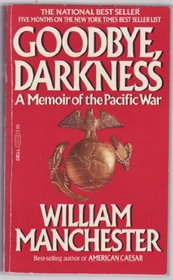Helpful Score: 1
I've read this book and I enjoyed it. But the important thing to remember when reading it is that Manchester states in the Introduction that he took license with the material.
Some of 'his' stories were actually the experiences of others that he changed to suit his story line.
As such, not everything in the book is true. Manchester was a machinegunner in the Marines. He fought in the battle for Okinawa where he was severely wounded. He did not participate in any previous battles the Marines fought in World War II. I'm not questioning his bravery, only his stories.
Some of 'his' stories were actually the experiences of others that he changed to suit his story line.
As such, not everything in the book is true. Manchester was a machinegunner in the Marines. He fought in the battle for Okinawa where he was severely wounded. He did not participate in any previous battles the Marines fought in World War II. I'm not questioning his bravery, only his stories.
Helpful Score: 1
While I mostly enjoyed the book, readers should read Manchester's preface before beginning the book. There he states portions of the book are fictionalized, as he used stories he heard from other Marines during his service.
While Manchester was in the Marines during World War II, the only combat he saw was as a machine gunner on Okinawa in 1944. This is not to understate Manchester's bravery as a Marine. In fact, more Marines died on Okinawa then on any other Pacific island. Okinawa was an extremely tough battle which saw terrible casualties on each side. Manchester was wounded during the battle and didn't serve in combat again. Manchester did not serve in any of the other island conflicts, even though in the book he writes as if he did.
I actually read this book in the late 1970s. Some of the things he mentions as "true" made me "gag," as they were just stories Marines tell each other, and were still doing so decades later when I served in the Marines.
I've read books on the Battle of Okinawa and served there for a total of 10 months. The really dark side of the battle was the terrible suffering of the Okinawan civilians.
While Manchester was in the Marines during World War II, the only combat he saw was as a machine gunner on Okinawa in 1944. This is not to understate Manchester's bravery as a Marine. In fact, more Marines died on Okinawa then on any other Pacific island. Okinawa was an extremely tough battle which saw terrible casualties on each side. Manchester was wounded during the battle and didn't serve in combat again. Manchester did not serve in any of the other island conflicts, even though in the book he writes as if he did.
I actually read this book in the late 1970s. Some of the things he mentions as "true" made me "gag," as they were just stories Marines tell each other, and were still doing so decades later when I served in the Marines.
I've read books on the Battle of Okinawa and served there for a total of 10 months. The really dark side of the battle was the terrible suffering of the Okinawan civilians.




